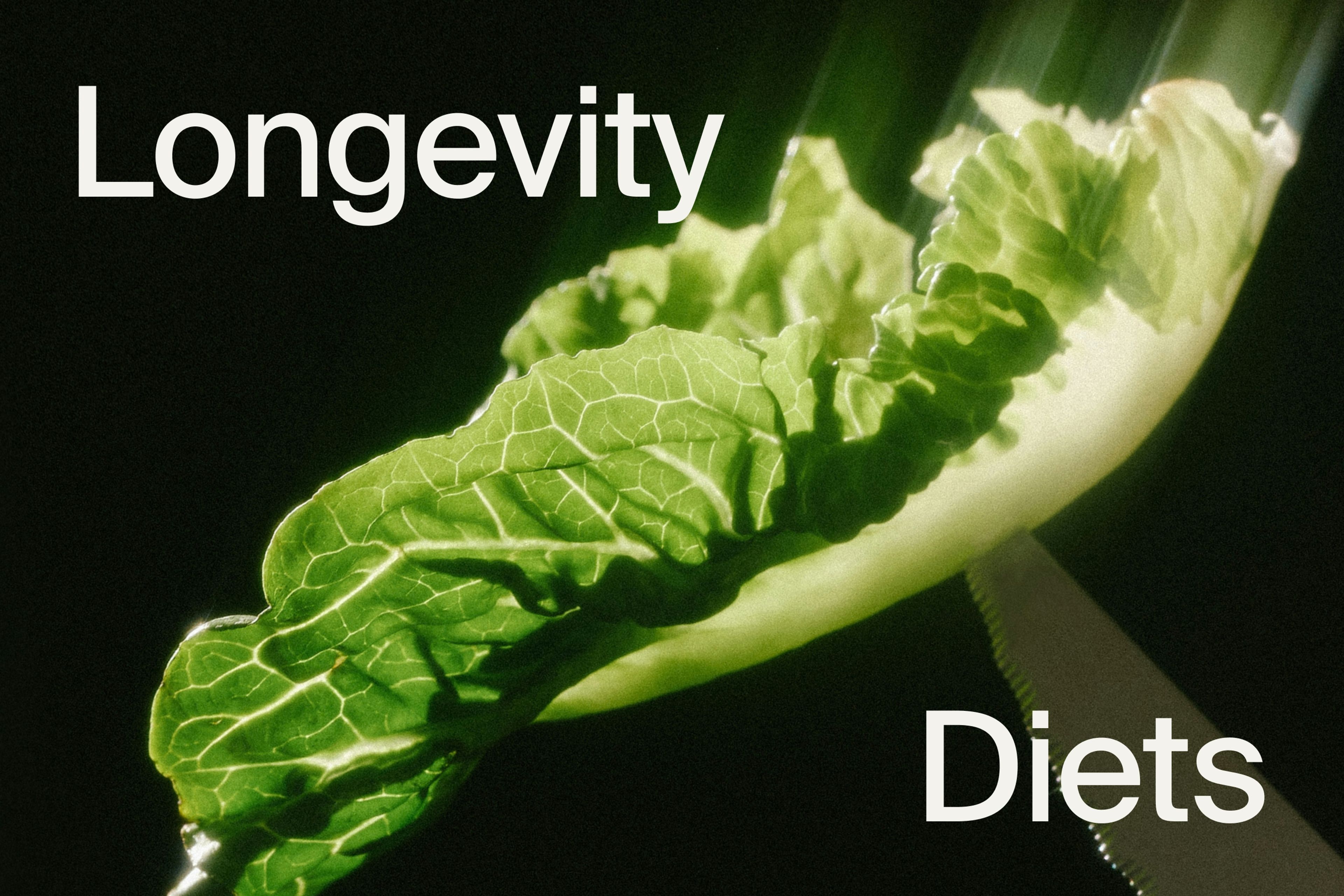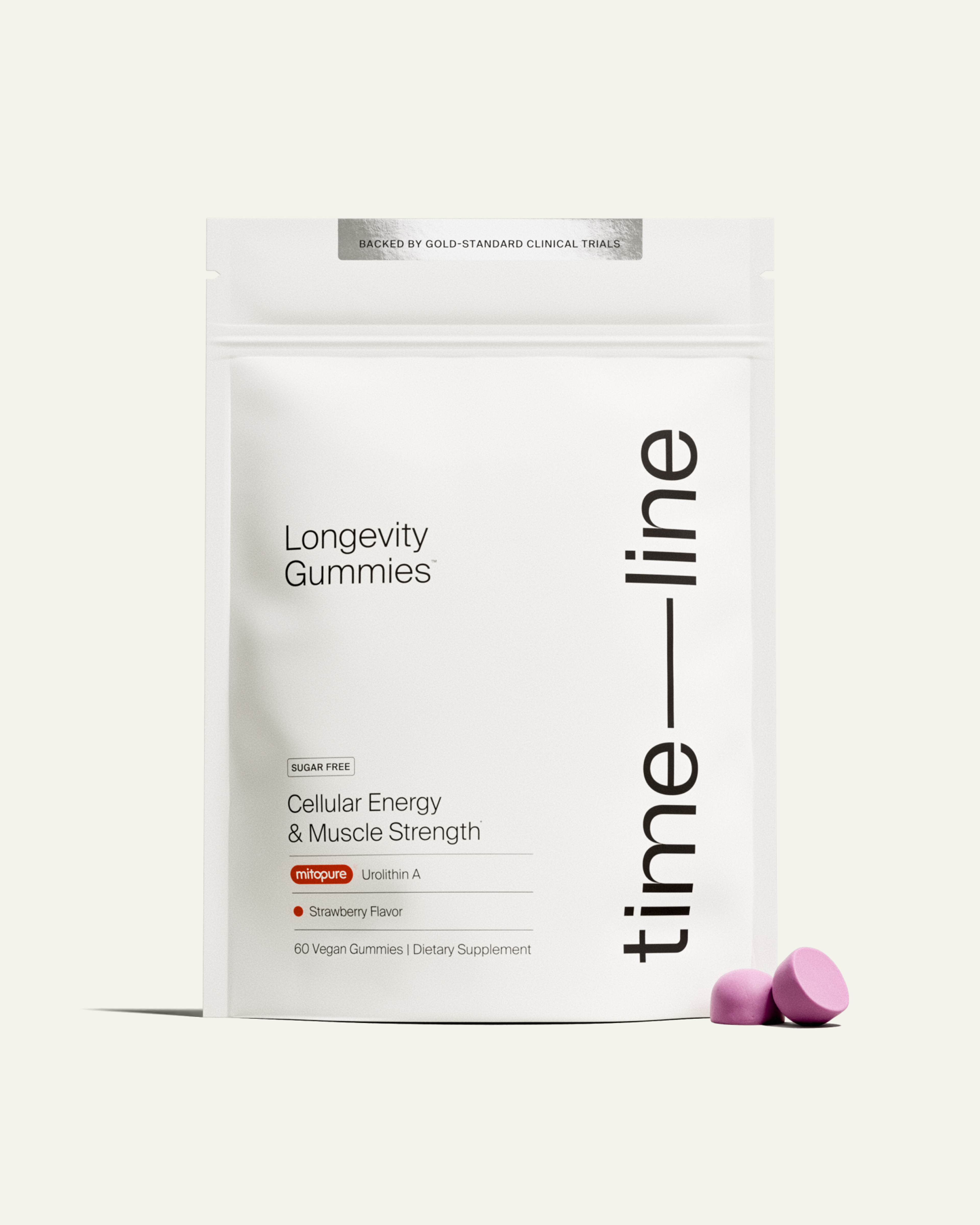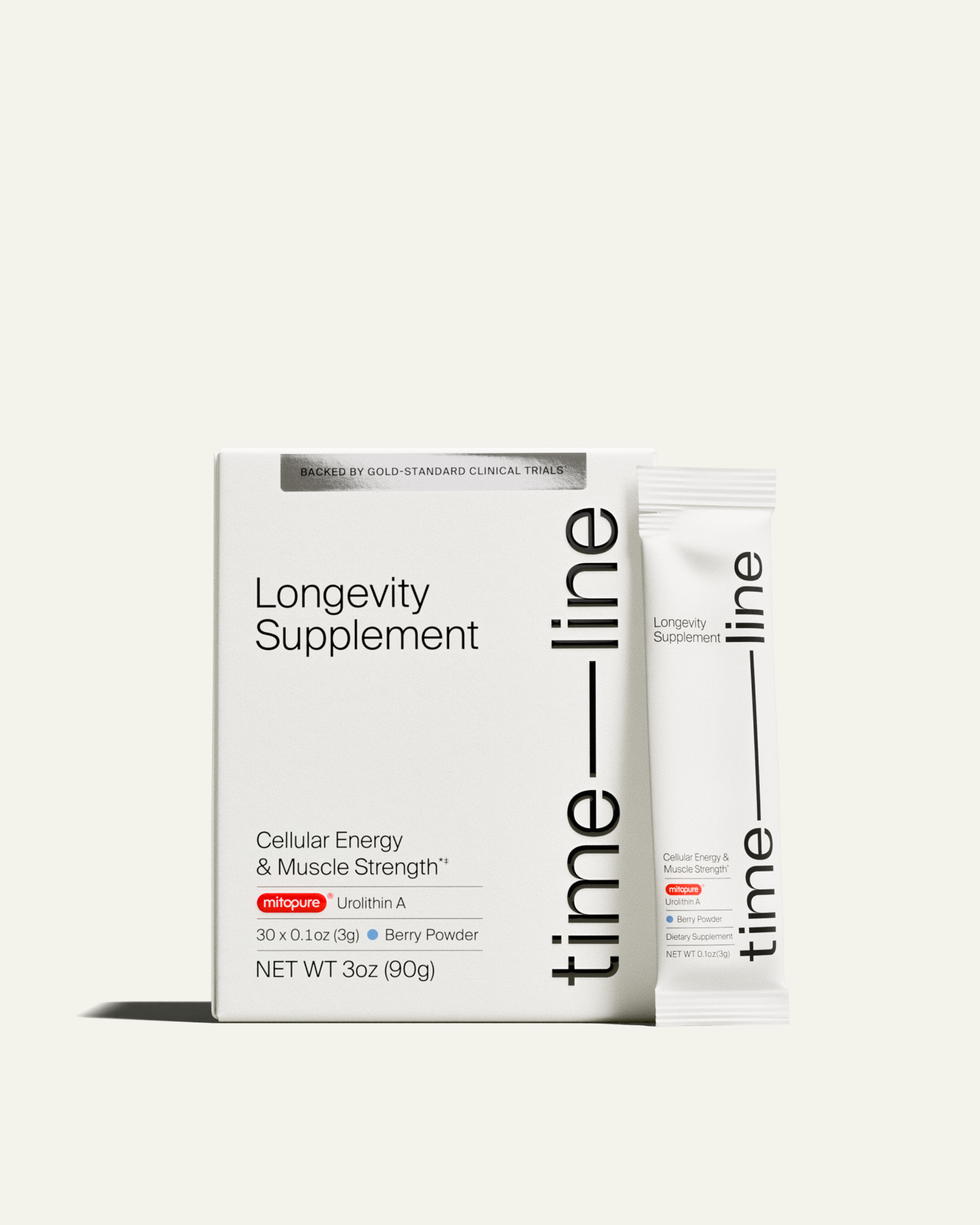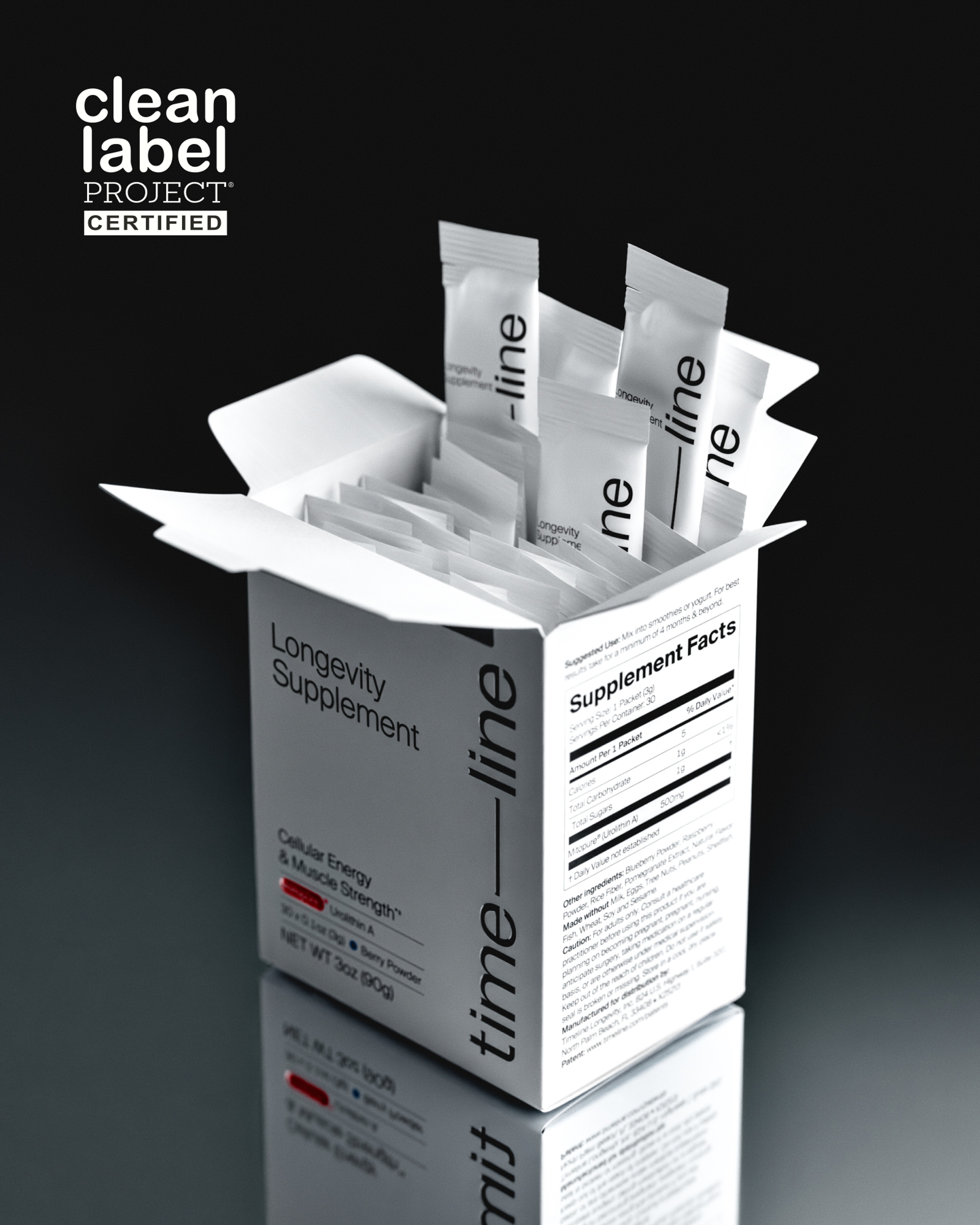Longevity Diet Showdown: Comparing Top Eating Plans
Uncover the top longevity diets, what to look for in a diet that supports lifelong health, and how to choose one that fits your lifestyle and goals.

What to know
A nutrient-dense, plant-forward eating pattern can improve health and extend lifespan.
All longevity diets emphasize whole, plant-based foods, healthy fats, fiber, and antioxidants and limit ultra-processed foods, added sugars, and excess sodium.
Types of longevity diets include the MIND diet, anti-inflammatory Mediterranean diet, plant-based eating, intermittent fasting, or the community-focused Blue Zones diet.
Longevity diets typically include other lifestyle habits like mindful eating, physical activity, and strong social connections.
Adding Mitopure to a longevity diet may enhance results by promoting mitochondrial health.
You have more control over your health than you would think. Research estimates that only 25% of your lifespan is determined by your genes. The rest is dictated by lifestyle, including your diet choices, which are a more influential factor.
Adhering to a longevity diet such as the Mediterranean diet, intermittent fasting, or the Blue Zones can provide significant health improvements for people of all ages. And the good news is, it is never too late or too early to improve your eating habits.
Let’s uncover the world’s top longevity diets, their central tenets, and how to choose one that best fits your lifestyle and goals.
What is a Longevity Diet?
A longevity diet is a way of eating that supports long-term health and helps prevent chronic disease. Studies suggest that the types of diets most associated with longevity focus on plant-based foods that promote cellular repair, reduce inflammation and oxidative stress, and support [1]heart and metabolic health.
These diets are typically rich in plants, fiber, and antioxidants, while limiting added sugars, saturated fat, sodium, and processed foods.
Eating for longevity isn't just about living longer; the goal is to reduce your risk of chronic diseases and to feel better as you age. Multiple studies have shown that switching from a traditional Western diet high in saturated fat, sodium, and added sugar to a longevity-focused pattern can add over a decade of life expectancy, with an enhanced quality of life.[2]
Traits of a Longevity Diet
While there are several forms of longevity diets, all of them include a few basic tenets:
- Low in added sugars and processed foods. Minimize refined carbs, such as white bread, sugary snacks, and ultra-processed foods like packaged chips, baked goods, fast food, and sugary beverages like soda.[3]
- Includes healthy fats. Emphasizes anti-inflammatory fats like olive oil, nuts, and fatty fish to support heart and brain health.[4]
- High in plant foods that are rich in phytochemicals: Phytonutrients support cellular health and longevity, in part due to their role as powerful anti-inflammatory agents.
- Rich in fiber: Adequate fiber supports gut health and helps to prevent age-related conditions like cardiovascular issues, diabetes and certain types of cancer.[5]
- Encourages mindful eating or caloric moderation. Often includes practices such as stopping before feeling full or time-restricted eating to support metabolic and cellular health.[6]
- May include fasting practices. Some longevity diets incorporate periods of intermittent fasting. This has been shown to support cellular repair and metabolic health through autophagy, a recycling process where damaged cells are removed and regenerated into healthier versions of themselves.[7]
- Tied to a lifestyle, not just food. Often includes regular physical activity, social connection, and cultivating a sense of purpose, which are all linked to longer, healthier lives.[8]
Types of Longevity Diets
These eating patterns are most strongly associated with improved longevity.

Mediterranean Diet
The Mediterranean diet has been named the best overall diet by U.S. News & World Report for several years. It originates from Europe in countries such as Italy, Greece, and France and promotes plants rich in fiber, healthy fats, and other anti-inflammatory compounds that support longevity.
This diet prioritizes vegetables, fruits, legumes, whole grains, nuts, seeds, olive oil, and is moderate in fish, dairy and wine. Red meat and refined grains are limited in this style of eating.[9]
The abundance of plant compounds in the Mediterranean diet is shown to reduce several key hallmarks of aging. [10]It also supports mitochondrial health, the cell’s energy centers, which are essential for longevity.
The Mediterranean way of eating has been linked to longer lifespan, and reduced all-cause mortality, as well as lower blood pressure and cholesterol levels[11], two major causes of stroke and heart attack in older adults.
Who it’s best for:
Someone looking for more variety in their diet and who likes to include both animal and plant-based protein sources.

MIND Diet
A combination of the Mediterranean Diet and DASH (Dietary Approaches to Stop Hypertension) diet, this diet prioritizes foods that support brain function and blood pressure as you age. MIND stands for Mediterranean Intervention for Neurodegenerative Delay.[12]
The MIND diet is rich in plant-based foods like beans, lentils, nuts, seeds, fruits, vegetables, and whole grains. It also encourages essential omega-3 fats found in fish, seeds, and seaweed, and is moderate in chicken and other poultry items.
The diet discourages fried foods and other foods high in saturated fat and added sugar, such as red meat, cheese, butter, baked goods, salt, and fast food. While the health verdict on saturated fat and heart disease is evolving, the MIND diet recommends limiting red meat due to its association with neurodegenerative diseases.[13]
Studies show the MIND diet is associated with greater cognitive resilience in aging, which means the brain is better able to stay sharp later in life.[14] A recent study in middle-aged adults also found that those who more closely adhered to the MIND diet were able to process information faster than those who didn’t follow the diet.
Who it’s best for:
Someone who is focused on preserving brain health with age, or someone who is looking for a low-sodium diet.

Continuous Calorie Restriction or Intermittent Fasting
The research is clear: eating too much increases the risk for obesity and several other chronic health conditions, which can negatively impact health and longevity.[15]
Intermittent fasting doesn’t prescribe a specific diet or food pattern, but instead focuses on the time of day when you eat. Going without food for extended periods triggers longevity pathways in the body and lowers overall caloric intake, which can promote healthy aging.[16]
Moderate calorie restriction, typically 10–30% fewer calories, has been linked to longer lifespan in several animal species. [17]Whether achieved through smaller portions or intermittent fasting, it’s essential to maintain adequate nutrition and avoid malnutrition by consuming all key nutrients. For some, cutting calories at every meal can be difficult, making alternating periods of fasting and eating a more sustainable approach.
Eating less calories and lengthening the time of your fasting window triggers autophagy, the beneficial process of clearing out damaged cells that accelerate aging and chronic diseases. [18]It also triggers a specific type of autophagy, called mitophagy, where damaged mitochondria are destroyed and recycled for mitochondrial health.
Who it’s best for:
A reduced-calorie diet or intermittent fasting may be beneficial for someone looking to lose and manage weight. It also has benefits for metabolic health and cellular health. However, it is not usually recommended for people who are underweight or have a history of eating disorders, as any sort of dietary restriction can exacerbate disordered eating behaviors.

Plant-Based Diet
Plant-based diets, when done correctly, are associated with longevity as they reduce the risk of diseases that can shorten lifespan. [19]A nutritious vegetarian and vegan diet is rich in fiber, antioxidants, polyphenols, and phytonutrients, compounds that help reduce inflammation, support gut health, and protect against chronic disease. [20]It also must have adequate protein to support muscle health with age.
Vegetarians and vegans also typically have a lower body mass index and healthier blood pressure and cholesterol levels than comparable meat-eaters.[21]
It’s important to keep in mind that not all plant-based diets are created equal, and it’s best to prioritize whole, nutrient-dense plants. These include fruits, vegetables, whole grains, and legumes rather than refined grains like white pasta, white bread, and other baked goods that are technically vegan or vegetarian.
Who it’s best for:
Someone who enjoys eating a variety of plants and who has high blood pressure, heart disease, or diabetes, as this way of eating can be beneficial in managing these conditions.[22] It may also be helpful if you’re trying to eat more fruits and vegetables but are having trouble fitting them into your diet with meat-based options.

Blue Zones Diet
The “Blue Zones” diet is modeled after the dietary patterns of the world’s longest-lived populations:
- Okinawa, Japan
- Sardinia, Italy
- Nicoya, Costa Rica
- Ikaria, Greece
- Loma Linda, California
These regions have many traditions in common, including a predominantly plant-based diet where 90% of food comes from whole, plant sources such as legumes, fruits, vegetables, whole grains, nuts, and seeds. Some Blue Zone cultures also follow the longstanding “Hara Hachi Bu” philosophy tied to longevity, which involves eating until 80% full.[23]
Eating is often slow, social, and part of a broader lifestyle that includes movement, purpose, and strong community ties, which are all shown to support healthy aging and overall happiness.
Who it’s best for:
The Blue Zone diet may be best for people who enjoy a primarily plant-based diet and also enjoy the community aspect of the diet.

The Keto Diet
The ketogenic diet is high in fat, very low in carbohydrates, and moderate in protein. It shifts the body into a metabolic state called ketosis, where fat becomes the primary fuel source.
Advocates suggest keto may improve metabolic health, reduce blood sugar, and insulin levels.[24] However, long-term data on keto for lifespan is limited, and many experts caution that it should be centered on healthy fats (olive oil, avocado, nuts) and non-starchy vegetables to minimize potential risks.
Who it’s best for:
People seeking short‑term metabolic gains (e.g., rapid weight loss or blood sugar control) who can closely monitor their lipid profiles.

The Carnivore Diet
The carnivore diet is an extreme low-carb approach consisting almost entirely of animal-based foods. It typically includes meat, fish, eggs, and some dairy.[25]
While short-term benefits for certain individuals may occur, research on its long-term health and longevity effects is minimal, and the near-complete absence of plant foods means missing out on fiber, antioxidants, and phytonutrients that are strongly associated with healthy aging.
Who it’s best for:
Possibly suited for short-term elimination diets in select cases (under medical supervision). Not recommended for individuals prioritizing long-term health or cellular aging.
Supplements to Support a Longevity Diet
Even the best longevity diet can leave gaps.
In today's modern world, gut conversion adds an extra hoop for nutrients to jump through. Because of this barrier, some nutrients never make it to your cells. Urolithin A is a prime example. Research shows that only 30–40% of people have the right gut microbes to produce it, and even then, you’d need to drink eight cups of pomegranate juice every day to get the same benefits seen with supplementation.[26]
Clinical studies have found that Mitopure (a clinically validated Urolithin A supplement) enhances cellular energy and has exercise-like effects by promoting mitochondrial recycling.

Mitopure Gummies
4.7 · 885 reviews
A strawberry-flavored dose of cellular energy
Wrapping Up: How to Choose the Best Longevity Diet For You
Longevity diets are generally rich in whole, plant-based foods, healthy fats, fiber, and antioxidants while limiting added sugars, sodium, and ultra-processed foods. They often encourage mindful eating practices, discourage overeating, and are tied to broader lifestyle habits like regular movement and social connection.
Whether it be the MIND diet, intermittent fasting, or a completely plant-based diet, the best longevity diet for you is the one that aligns with your goals. It needs to match your personal preferences, health status, and lifestyle, so that you can stick with it long-term.
And if you need a little extra help, adding Mitopure to a longevity-focused diet may further enhance mitochondrial health, improve energy levels, and promote healthy aging from the inside out.
Authors

Written by
Dietitian-Nutritionist, and Health Content Writer

Reviewed by
Director Science Communications
References
- ↑
Caruso, C., Ligotti, M. E., Accardi, G., Aiello, A., Duro, G., Galimberti, D., & Candore, G. (2022). How Important Are Genes to Achieve Longevity?. International journal of molecular sciences, 23(10), 5635. https://doi.org/10.3390/ijms23105635 (https://www.google.com/url?q=https://doi.org/10.3390/ijms23105635&sa=D&source=docs&ust=1758301441925663&usg=AOvVaw0WA1f8x4E0jfwV96FcHey9)
- ↑
Ilari, S., Proietti, S., Milani, F., Vitiello, L., Muscoli, C., Russo, P., & Bonassi, S. (2025). Dietary Patterns, Oxidative Stress, and Early Inflammation: A Systematic Review and Meta-Analysis Comparing Mediterranean, Vegan, and Vegetarian Diets. Nutrients, 17(3), 548. https://doi.org/10.3390/nu17030548 (https://www.google.com/url?q=https://doi.org/10.3390/nu17030548&sa=D&source=docs&ust=1758301441931034&usg=AOvVaw3lZ3UZ9b-FkgaqCsLI3Xt3)
- ↑
Liang, S., Zhou, Y., Zhang, Q., Yu, S., & Wu, S. (2025). Ultra-processed foods and risk of all-cause mortality: an updated systematic review and dose-response meta-analysis of prospective cohort studies. Systematic reviews, 14(1), 53. https://doi.org/10.1186/s13643-025-02800-8 (https://www.google.com/url?q=https://doi.org/10.1186/s13643-025-02800-8&sa=D&source=docs&ust=1758301441932375&usg=AOvVaw1uaSOtHewkEuzIuYT12Phh)
- ↑
Tessier, A. J., Cortese, M., Yuan, C., Bjornevik, K., Ascherio, A., Wang, D. D., Chavarro, J. E., Stampfer, M. J., Hu, F. B., Willett, W. C., & Guasch-Ferré, M. (2024). Consumption of Olive Oil and Diet Quality and Risk of Dementia-Related Death. JAMA network open, 7(5), e2410021. https://doi.org/10.1001/jamanetworkopen.2024.10021 (https://www.google.com/url?q=https://doi.org/10.1001/jamanetworkopen.2024.10021&sa=D&source=docs&ust=1758301441936566&usg=AOvVaw21BIIU2kHcL-dV_Cnz55Rp)
- ↑
Abdolghaffari, A., Farzaei, M., Lashgari, N., Roudsari, N., Haddadi, N., Singh, A., Rana, H., Pandey, A., & Momtaz, S. (2020). Dietary Fiber and Aging. , 111-145. https://doi.org/10.1007/978-981-15-3552-9_6 (https://www.google.com/url?q=https://doi.org/10.1007/978-981-15-3552-9_6&sa=D&source=docs&ust=1758301441966386&usg=AOvVaw31cXmoCpT7KPhjcmXOM_lJ).
- ↑
Dorling, J. L., Martin, C. K., & Redman, L. M. (2020). Calorie restriction for enhanced longevity: The role of novel dietary strategies in the present obesogenic environment. Ageing research reviews, 64, 101038. https://doi.org/10.1016/j.arr.2020.101038 (https://www.google.com/url?q=https://doi.org/10.1016/j.arr.2020.101038&sa=D&source=docs&ust=1758301441937864&usg=AOvVaw3d-8f6Uqg5EoYOOg-ZlLC7)
- ↑
Shabkhizan, R., Haiaty, S., Moslehian, M. S., Bazmani, A., Sadeghsoltani, F., Saghaei Bagheri, H., Rahbarghazi, R., & Sakhinia, E. (2023). The Beneficial and Adverse Effects of Autophagic Response to Caloric Restriction and Fasting. Advances in nutrition (Bethesda, Md.), 14(5), 1211–1225. https://doi.org/10.1016/j.advnut.2023.07.006 (https://www.google.com/url?q=https://doi.org/10.1016/j.advnut.2023.07.006&sa=D&source=docs&ust=1758301441940079&usg=AOvVaw0kdHycZ90nfU4TsAUX22dz)
- ↑
Reimers, C. D., Knapp, G., & Reimers, A. K. (2012). Does physical activity increase life expectancy? A review of the literature. Journal of aging research, 2012, 243958. https://doi.org/10.1155/2012/243958 (https://www.google.com/url?q=https://doi.org/10.1155/2012/243958&sa=D&source=docs&ust=1758301441944319&usg=AOvVaw0qpS7avQ90Sf9-g8pbuLRt)
- ↑
Shannon, O. M., Ashor, A. W., Scialo, F., Saretzki, G., Martin-Ruiz, C., Lara, J., Matu, J., Griffiths, A., Robinson, N., Lillà, L., Stevenson, E., Stephan, B. C. M., Minihane, A. M., Siervo, M., & Mathers, J. C. (2021). Mediterranean diet and the hallmarks of ageing. European journal of clinical nutrition, 75(8), 1176–1192. https://doi.org/10.1038/s41430-020-00841-x (https://www.google.com/url?q=https://doi.org/10.1038/s41430-020-00841-x&sa=D&source=docs&ust=1758301441935038&usg=AOvVaw3XYUv2CWS-egGIvBQW2uQg)
- ↑
Shannon, O. M., Ashor, A. W., Scialo, F., Saretzki, G., Martin-Ruiz, C., Lara, J., Matu, J., Griffiths, A., Robinson, N., Lillà, L., Stevenson, E., Stephan, B. C. M., Minihane, A. M., Siervo, M., & Mathers, J. C. (2021). Mediterranean diet and the hallmarks of ageing. European journal of clinical nutrition, 75(8), 1176–1192. https://doi.org/10.1038/s41430-020-00841-x (https://www.google.com/url?q=https://doi.org/10.1038/s41430-020-00841-x&sa=D&source=docs&ust=1758301441907240&usg=AOvVaw1xRlwj1DEcrTBrFux-UVib)
- ↑
Mayo Clinic Staff. Mediterranean diet: A heart-healthy eating plan. Mayo Clinic. Published 2021. https://www.mayoclinic.org/healthy-lifestyle/nutrition-and-healthy-eating/in-depth/mediterranean-diet/art-20047801 (https://www.google.com/url?q=https://www.mayoclinic.org/healthy-lifestyle/nutrition-and-healthy-eating/in-depth/mediterranean-diet/art-20047801&sa=D&source=docs&ust=1758301441957532&usg=AOvVaw36u-XN9QAfxchTjKMS3N1G)
- ↑
Morris, M. C., Tangney, C. C., Wang, Y., Sacks, F. M., Barnes, L. L., Bennett, D. A., & Aggarwal, N. T. (2015). MIND diet slows cognitive decline with aging. Alzheimer's & dementia : the journal of the Alzheimer's Association, 11(9), 1015–1022. https://doi.org/10.1016/j.jalz.2015.04.011 (https://www.google.com/url?q=https://doi.org/10.1016/j.jalz.2015.04.011&sa=D&source=docs&ust=1758301441946440&usg=AOvVaw24mZy2MNXVdr1AKN5xx_Se)
- ↑
Dehghan, Mahshid et al. “Associations of fats and carbohydrate intake with cardiovascular disease and mortality in 18 countries from five continents (PURE): a prospective cohort study.” Lancet (London, England) vol. 390,10107 (2017): 2050-2062. doi:10.1016/S0140-6736(17)32252-3
- ↑
Dhana K, James BD, Agarwal P, et al. MIND Diet, Common Brain Pathologies, and Cognition in Community-Dwelling Older Adults. J Alzheimers Dis. 2021;83(2):683-692. doi:10.3233/JAD-210107
- ↑
Fontaine, K. R., Redden, D. T., Wang, C., Westfall, A. O., & Allison, D. B. (2003). Years of life lost due to obesity. JAMA, 289(2), 187–193. https://doi.org/10.1001/jama.289.2.187 (https://www.google.com/url?q=https://doi.org/10.1001/jama.289.2.187&sa=D&source=docs&ust=1758301441908635&usg=AOvVaw2SiQfJE84lQMj4_3EMzDf-)
- ↑
Green, C., Lamming, D., & Fontana, L. (2021). Molecular mechanisms of dietary restriction promoting health and longevity. Nature Reviews Molecular Cell Biology, 23, 56-73. https://doi.org/10.1038/s41580-021-00411-4 (https://www.google.com/url?q=https://doi.org/10.1038/s41580-021-00411-4&sa=D&source=docs&ust=1758301441947584&usg=AOvVaw3MrMfwVeXEabcBIAVg9M6X).
- ↑
Lee, S., & Min, K. (2013). Caloric restriction and its mimetics. BMB Reports, 46, 181 - 187. https://doi.org/10.5483/BMBRep.2013.46.4.033 (https://www.google.com/url?q=https://doi.org/10.5483/BMBRep.2013.46.4.033&sa=D&source=docs&ust=1758301441948243&usg=AOvVaw3XrSeeJaonFPKDn5Y9bQGr).
- ↑
Mattson, M. P., Longo, V. D., & Harvie, M. (2017). Impact of intermittent fasting on health and disease processes. Ageing research reviews, 39, 46–58. https://doi.org/10.1016/j.arr.2016.10.005 (https://www.google.com/url?q=https://doi.org/10.1016/j.arr.2016.10.005&sa=D&source=docs&ust=1758301441910340&usg=AOvVaw2omAiRbdBbIcpN7lXsu4M7)
- ↑
Herpich C, Müller-Werdan U, Norman K. Role of plant-based diets in promoting health and longevity. Maturitas. 2022;165:47-51. doi:10.1016/j.maturitas.2022.07.003
- ↑
Alahmari LA. Dietary fiber influence on overall health, with an emphasis on CVD, diabetes, obesity, colon cancer, and inflammation. Frontiers in Nutrition. 2024;11. doi:https://doi.org/10.3389/fnut.2024.1510564 (https://www.google.com/url?q=https://doi.org/10.3389/fnut.2024.1510564&sa=D&source=docs&ust=1758301441963042&usg=AOvVaw3ByRRDkB9qJFQqRNDR4zKu)
- ↑
Key TJ, Papier K, Tong TYN. Plant-based diets and long-term health: findings from the EPIC-Oxford study. Proc Nutr Soc. 2022;81(2):190-198. doi:10.1017/S0029665121003748
- ↑
Liang, J., Wen, Y., Yin, J. et al. Utilization of plant-based foods for effective prevention of chronic diseases: a longitudinal cohort study. npj Sci Food 8, 113 (2024). https://doi.org/10.1038/s41538-024-00362-y (https://www.google.com/url?q=https://doi.org/10.1038/s41538-024-00362-y&sa=D&source=docs&ust=1758301441963972&usg=AOvVaw0IY_GXCTrnnLWg4jzDS0Ev)
- ↑
Mishra BN. Secret of eternal youth; teaching from the centenarian hot spots ("blue zones"). Indian J Community Med. 2009;34(4):273-275. doi:10.4103/0970-0218.58380
- ↑
Alluwyam, A., & Estrella, E. (2024). Ketogenic Diet and Its Potential Role in Preventing Type 2 Diabetes Mellitus and Its Complications: A Narrative Review of Randomized Controlled Trials. Cureus, 16. https://doi.org/10.7759/cureus.66419 (https://www.google.com/url?q=https://doi.org/10.7759/cureus.66419&sa=D&source=docs&ust=1758301441974300&usg=AOvVaw1NFGLVC-J7j8A_8KoUevpF).
- ↑
Goedeke, S., Murphy, T., Rush, A., & Zinn, C. (2024). Assessing the Nutrient Composition of a Carnivore Diet: A Case Study Model. Nutrients, 17(1), 140. https://doi.org/10.3390/nu17010140 (https://www.google.com/url?q=https://doi.org/10.3390/nu17010140&sa=D&source=docs&ust=1758301441912808&usg=AOvVaw1xAt1VKOHbOJq06x0B0f1G)
- ↑
Singh, A., D’Amico, D., Andreux, P.A. et al. Direct supplementation with Urolithin A overcomes limitations of dietary exposure and gut microbiome variability in healthy adults to achieve consistent levels across the population. Eur J Clin Nutr 76, 297–308 (2022). https://doi.org/10.1038/s41430-021-00950-1 (https://www.google.com/url?q=https://doi.org/10.1038/s41430-021-00950-1&sa=D&source=docs&ust=1758301441976171&usg=AOvVaw19Xkxb_yg6cFVWWDKIO0Hp)










